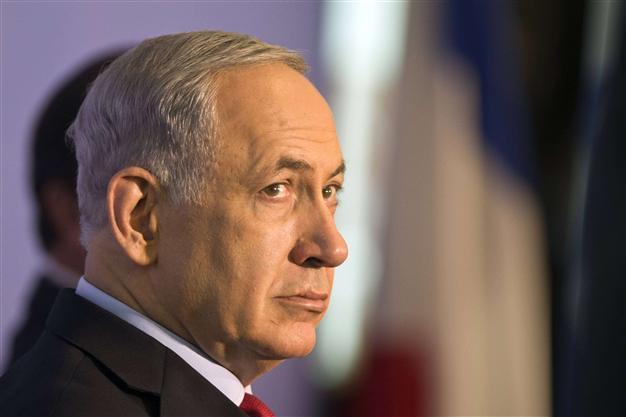Netanyahu takes Iran nuclear campaign to Kremlin
JERUSALEM - Agence France-Presse

Israeli Prime Minister Benjamin Netanyahu. AFP photo
At odds with ally Washington over terms of an emerging international nuclear agreement with Iran, Israeli Prime Minister Benjamin Netanyahu will on Wednesday take his campaign against the deal to Moscow.
"We'd like them to have a better understanding of our concerns and the need to prevent Iran from having a breakout capacity," an Israeli official told AFP ahead of the trip.
"A breakout capacity means that they have the capability to develop a nuclear weapon at a time and a place of their choosing in the future," the official said.
Russia is a member of the P5+1 grouping, alongside the United States, China, France, Britain and Germany, which will meet on Wednesday in Geneva with Iran for talks on its nuclear programme.
Israel and the West have long accused Iran of seeking a nuclear weapons capability, but Tehran insists its controversial uranium enrichment programme is for entirely peaceful purposes.
A previous round of talks ended inconclusively on November 10, but US Secretary of State John Kerry on Monday expressed hope that this session would show progress toward an interim agreement. "We will try to get a first-step agreement and hope that Iran will understand the importance of coming there prepared to create a document that can prove to the world that this is a peaceful programme," he said. Netanyahu vehemently opposes the nascent deal which he says would prematurely ease sanctions against Iran without a commitment it will halt enrichment of uranium or stop work on its heavy-water plant.
"You are not really dismantling any capacity to make fissile material for nuclear weapons," he said in an interview published in top-selling German daily Bild on Tuesday.
"Iran gets to keep all its centrifuges. Thousands of them. It makes a minor concession that it can reverse in weeks. And what are the P5+1 giving Iran? They are giving it reduced sanctions which could very quickly lead to the crumbling of the entire sanctions regime. "So the P5+1 are giving Iran a great deal, Iran is giving practically nothing. That's a bad deal," the Israeli premier said.
"It's particularly bad now when Iran is feeling finally the crippling sanctions, when you actually have them on the ropes, when you can actually get them to dismantle their nuclear weapons infrastructure, you are letting off the pressure." Netanyahu raised the issue with visiting French President Francois Hollande who assured him that France "will not tolerate nuclear proliferation".
And he said he would do the same in talks with Russian President Vladimir Putin in Moscow this week.
The visit comes amid a growing US diplomatic vacuum in the Middle East, stemming from Washington's lack of will to flex its muscles in the wake of costly failures in Iraq and Afghanistan.
And Moscow appears to be keen to fill that void -- an impression which was reinforced last week when Russian Foreign Minister Sergei Lavrov and Defence Minister Sergei Shoigu went to Cairo for a visit devoted to military and diplomatic ties.
Netanyahu's vociferous opposition to anything less than a fully watertight Geneva agreement and his very public spat with Kerry over the matter have sparked warnings from local analysts that the matter could turn into a diplomatic boomerang for Israel.
Some suggest Netanyahu may be seeking to play the Kremlin off against the White House. Amnon Sela, professor emeritus of international relations at Jerusalem's Hebrew University says that to do so would be a mistake.
"I very much hope that he will not try such an exercise," he told AFP. "I think he has already taken some steps which are very harmful to Israel, with his opposition to President (Barack) Obama and trying to enlist (US) public opinion and Congress against the president, and in particular the American Jewish community which immediately raises the question of dual loyalties." Even if Russia would like to fill the gap, it lacks the resources, he said.
"It is not capable of playing any role beyond that which it already has, in Iran, Syria and (Lebanese Shiite movement) Hezbollah." "It has no possibility; not economically, nor diplomatically," he said. "It could act only together with the United States." Israel, itself widely assumed to have a formidable nuclear arsenal, has refused to rule out bombing Iran, as has Washington.
